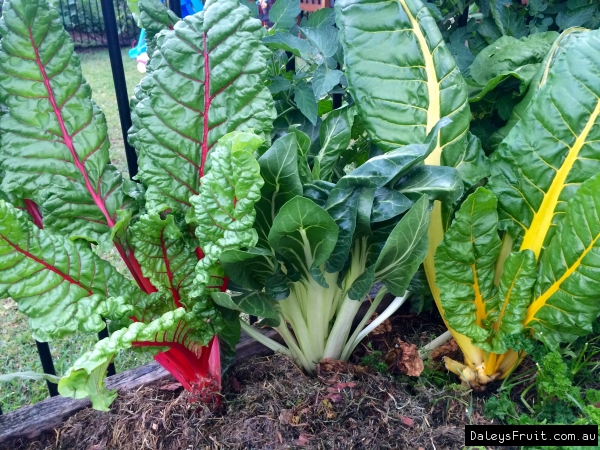Perennial vegetables
CategoryPerennial Vegetables make unusual, highly appealing ornamental plants that provide edible leaves or tubers for most of the year. Apart from being a plentiful food source they also serve other functions around the house such as screening (Arrowroot), ground covers (sweet potato), and edge plants used as a barrier against weeds (comfrey).
Bamboo - Edible
Fruit Trees > Perennial vegetables > Bamboo - Edible
Trees and Plants > Hedge Plants > Bamboo - Edible
The fastest growing plant in the world, bamboo is an excellent and useful landscaping plant. It produces edible shoots and an endless supply of canes that can be used for a multitude of purposes around the garden. To ensure the safe consumption of bamboo shoots, it's important to boil them before use. This process helps to remove the cyanogenic glycosides produced by the plant as a defence against herbivores. It's advisable to boil for at least 20mins and change the water once or twice during boiling to ensure all toxins are eliminated. Bamboos considered edible have a sweet pleasant taste when this is done. Other bamboos considered inedible can be rendered safe to eat after boiling but may be bitter in taste.
Rhubarb
Fruit Trees > Perennial vegetables > Rhubarb
The perennial rhubarb is often referred to as the 'pie plant' due to its use in pies but it also lends itself to a wide range of muffins, biscuits, cakes, as well as fancier desserts. Versatile in savory dishes, rhubarb provides a piquant base for marinades and condiments to pair with roasted meats and poultry. It is a highly productive fruit that can be harvested within 6 months.
Strawberry
Fruit Trees > Berries Vines and Climbers > Strawberry
Fruit Trees > Perennial vegetables > Strawberry
One of the best fruits for small space, strawberries are perfect for pots and patios. The name strawberry is often thought to come from the fact that a mulch of straw is perfect to keep the fruit off the ground, however it more likely originates from the old name strewn berry referring to the fact that the runners love to spread themselves from the parent plant. A delightful fruit used in desserts and sauces, but always best picked and eaten straight from the garden.
Sweet Potato
Fruit Trees > Perennial vegetables > Sweet Potato
The Sweet Potato is a perennial trailing plant that develops fleshy tuberous roots.
Taro
Fruit Trees > Perennial vegetables > Taro
Taro is a staple crops of the Pacific Islands and is also very popular throughout many parts of Asia. The delicious tuber can substitute potato in almost any dish, baked, boiled or made into chips. Its very ornamental heart-shaped leaves make a great spinach when cooked thoroughly. Note that Taro leaves contain oxalic acid (also referred to as oxalates), which will cause irritation to the throat if the leaves are consumed without sufficient cooking. Long term use without proper cooking may lead to kidney stones The plant prefers moist, deep soil and it grows well in both full shade and full sun. While in the Pacific Islands ( the place of origin for the Taro) there are hundreds of different varieties, in commercial production in Australia we generally see two main cultivars, which to simplify the diversity have been separated into: Japanese and Pacific Taro Be aware that the Taro looks quite similar to the Elephants Ear and the native Cunjevoi is NOT edible.
Yam - Oca
Fruit Trees > Perennial vegetables > Yam - Oca
Plant List > Herbs, Spices & Perennial Vegetables > Yam - Oca
A tuberous vegetable that produces colourful tubers that can be cooked like potato or eaten raw. The plant is attractive, having the typical leaves of oxalis, which is similar to the well known clover leaf. These are best suited to temperate climates. It is recommended to plant in Spring in cool areas and at the beginning of the Autumn in warmer areas. They can be kept in a fridge until ready for planting. Be careful not to freeze it. Protect from heat in all climate zones. Plant with about 5cm coverage, 30cm apart. Best harvests are had when the plants are hilled as for potatoes from about 4 months after planting. They are ready to harvest when the tops start to die back.














































































































